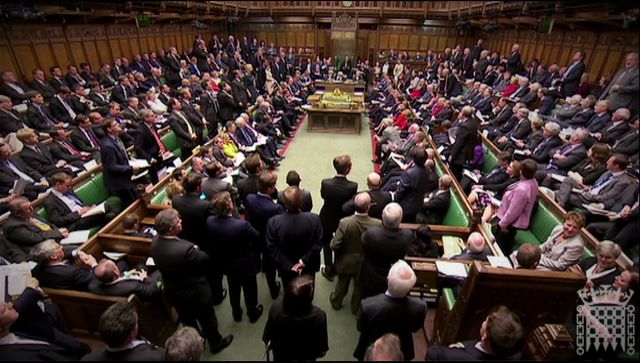9.4.1
Backbenchers
Backbenchers
Backbenchers
Backbenchers are MPs in the House of Commons and members of the House of Lords that are not part of the government or the opposition party’s leadership team.


Backbenchers as Representatives
Backbenchers as Representatives
- Backbenchers represent UK citizens through impacting on laws and scrutinising the government.
- Backbenchers in the House of Commons represent the interests of the citizens in their constituency.


Government policy and legislation
Government policy and legislation
- Backbenchers in the House of Commons represent their constituents' interests and should vote on legislation in a way which meets their constituents’ interests.
- House of Lords' backbenchers look to improve legislation.
- All backbenchers can speak in Parliamentary debates over legislation.
- Backbenchers can participate in voting in favour of or against legislation.
- Backbenchers are members of standing committees which review bills in detail.
- Backbenchers can put forward Private Members’ bills.


Government scrutiny
Government scrutiny
- Backbenchers scrutinise the government and hold it accountable for its actions.
- Backbenchers can question government ministers during Question time and the Prime Minister in Prime Minister’s Questions on their policies and actions to ensure they are held to account.
- Backbenchers make up and chair select committees which scrutinise government departments.
- Backbench MPs can write questions to ministers about issues which impact their constituents which ministers must reply to.


Party delegates
Party delegates
- Backbenchers are expected to support their party in Parliament.
- Backbenchers of the party in government are expected to not overly criticise the government and to follow the party line when voting.
- Backbenchers of the opposition parties have a role to oppose the government through criticism in ministers questions and voting against government policies.


Parliamentary privilege
Parliamentary privilege
- Parliamentary privilege enables backbenchers to carry out their roles, particularly representing the electorate’s interests through having free speech.
- Parliamentary privilege ensures that MPs and members of the House of Lords can freely debate on any issue without interference.
- Parliamentary privilege gives backbenchers legal immunity over what they say in Parliament.
- MPs used their parliamentary privilege during the Ryan Giggs affair to name the footballer who had taken out an injunction over an affair.
Significance of Backbenchers
Significance of Backbenchers
Backbenchers can have a significant role, but party whips can reduce this, as well as how willing the government is to support private members' bills and select committees


Significant role: rebellions
Significant role: rebellions
- Backbenchers often make up the majority of a party in Parliament. The government’s backbenchers are important to pass legislation.
- Backbenchers can use their vote to express support or discontent with the Government.
- Backbench rebellions can change the direction of government policy.
- In 2012, 91 Conservative backbenchers voted against coalition government plans for House of Lords reform.


Significant role: constituency
Significant role: constituency
- Backbenchers are important for the voices of their constituencies to be heard - and can spend more time in their constituencies because they are not ministers. -Rebelling backbenchers often prioritise their constituency.


Significant role: other
Significant role: other
- Backbenchers can change public policy by introducing Private Members’ Bills.
- Backbenchers in committees can hold government ministers to account and research policies.


Not significant role
Not significant role
- Party whips have a lot of power over backbenchers, which reduces the likelihood of a backbench rebellion.
- If a ‘three-line whip’ is enacted, backbenchers risk being removed from their party and having to sit as an independent in parliament if they vote against the party’s position.
- Private members’ bills are rarely successful, especially if the government doesn’t back them.
- Select committees are often ignored by the Government.
1Democracy & Participation
1.1Representative & Direct Democracy
1.2Wider Franchise & Suffrage
1.3Pressure Groups & Other Influences
2Political Parties
2.1How Political Parties Work
2.2Established Political Parties
2.3Emerging & Minor Political Parties
3Electoral Systems
3.1Different Electoral Systems
3.2Referendums & How They Are Used
4Voting Behaviour & the Media
5Conservatism
5.1Conservatism: Core Ideas & Principles
5.2Conservatism: Differing Views & Tensions
6Liberalism
6.1Liberalism: Core Ideas & Principles
6.2Differing Views And Tensions Within Liberalism
7Socialism
7.1Socialism: Core Ideas & Principles
7.2Differing Views And Tensions Within Socialism
8The UK Constitution
8.1Nature & Sources of UK Constitution
8.2Constitutional Change since 1997
8.3Role & Powers of Devolved UK Bodies
9The UK Parliament
9.1Houses of Parliament
9.2Comparative Powers
9.3Legislative Process
10The Prime Minister & the Executive
10.1The Executive
10.2Ministerial Responsibility
10.3Prime Minister & the Cabinet
10.3.1Role of the Prime Minister
10.3.2Prime Minister's Powers
10.3.3Limits on the Prime Minister's Powers
10.3.4Role of the Cabinet
10.3.5Prime Minister & Cabinet: Relations
10.3.6Prime Minister & Cabinet: Balance of Power
10.3.7Prime Minister & Cabinet: Case Studies
10.3.8End of Topic Test - PM & Cabinet
10.3.9Top Grade AO3/4 - PM & Cabinet
11Relationships Between Government Branches
11.1The Supreme Court
11.2Parliament & Executive Relations
11.3The European Union & the UK
11.4Sovereignty in the UK Political System
12US Constitution & Federalism
12.1Nature of the US Constitution
12.2Principles of the US Constitution
12.3Federalism
13US Congress
13.1Structure of Congress
13.2Functions of Congress
14US Presidency
14.1Presidential Power
14.2The Presidency
14.3Interpretations & Debates of the US Presidency
15US Supreme Court & Civil Rights
15.1Nature & Role of Supreme Court
15.2Supreme Court Appointment Process
15.3The Supreme Court & Public Policy
15.4Protection of Civil Liberties & Rights
15.5Debates & Interpretations of the Supreme Court
16US Democracy & Participation
16.1Presidential Elections
16.2Electoral College
16.3Electoral Campaigns
16.4Incumbency
16.5Democrats & Republicans
16.6Internal Conflict & Ideology
16.7Support & Demographics
17Comparing Democracies
17.1Theoretical Approaches
17.2UK & USA Similarities & Differences
17.2.1Constitution: Nature
17.2.2Constitution: Provisions & Principles
17.2.3Federal System & Devolution
17.2.4Legislative: Lower Houses of Government
17.2.5Legislative: Upper Houses of Government
17.2.6Legislative: Powers & Functions
17.2.7Executive
17.2.8Supreme Court
17.2.9Supreme Court: Judicial Independence
17.2.10Civil Rights
17.2.11Civil Rights: Interest Groups
17.2.12Party Systems & Parties
17.2.13Campaign Finance & Pressure Groups
17.2.14End of Topic Test - Comparing UK & US
17.2.15Application Questions - UK & USA
18Feminism
18.1Feminism: Core Ideas & Principles
18.2Different Types of Feminism
19Nationalism
19.1Nationalism: Core Ideas & Principles
19.2Different Types of Nationalism
Jump to other topics
1Democracy & Participation
1.1Representative & Direct Democracy
1.2Wider Franchise & Suffrage
1.3Pressure Groups & Other Influences
2Political Parties
2.1How Political Parties Work
2.2Established Political Parties
2.3Emerging & Minor Political Parties
3Electoral Systems
3.1Different Electoral Systems
3.2Referendums & How They Are Used
4Voting Behaviour & the Media
5Conservatism
5.1Conservatism: Core Ideas & Principles
5.2Conservatism: Differing Views & Tensions
6Liberalism
6.1Liberalism: Core Ideas & Principles
6.2Differing Views And Tensions Within Liberalism
7Socialism
7.1Socialism: Core Ideas & Principles
7.2Differing Views And Tensions Within Socialism
8The UK Constitution
8.1Nature & Sources of UK Constitution
8.2Constitutional Change since 1997
8.3Role & Powers of Devolved UK Bodies
9The UK Parliament
9.1Houses of Parliament
9.2Comparative Powers
9.3Legislative Process
10The Prime Minister & the Executive
10.1The Executive
10.2Ministerial Responsibility
10.3Prime Minister & the Cabinet
10.3.1Role of the Prime Minister
10.3.2Prime Minister's Powers
10.3.3Limits on the Prime Minister's Powers
10.3.4Role of the Cabinet
10.3.5Prime Minister & Cabinet: Relations
10.3.6Prime Minister & Cabinet: Balance of Power
10.3.7Prime Minister & Cabinet: Case Studies
10.3.8End of Topic Test - PM & Cabinet
10.3.9Top Grade AO3/4 - PM & Cabinet
11Relationships Between Government Branches
11.1The Supreme Court
11.2Parliament & Executive Relations
11.3The European Union & the UK
11.4Sovereignty in the UK Political System
12US Constitution & Federalism
12.1Nature of the US Constitution
12.2Principles of the US Constitution
12.3Federalism
13US Congress
13.1Structure of Congress
13.2Functions of Congress
14US Presidency
14.1Presidential Power
14.2The Presidency
14.3Interpretations & Debates of the US Presidency
15US Supreme Court & Civil Rights
15.1Nature & Role of Supreme Court
15.2Supreme Court Appointment Process
15.3The Supreme Court & Public Policy
15.4Protection of Civil Liberties & Rights
15.5Debates & Interpretations of the Supreme Court
16US Democracy & Participation
16.1Presidential Elections
16.2Electoral College
16.3Electoral Campaigns
16.4Incumbency
16.5Democrats & Republicans
16.6Internal Conflict & Ideology
16.7Support & Demographics
17Comparing Democracies
17.1Theoretical Approaches
17.2UK & USA Similarities & Differences
17.2.1Constitution: Nature
17.2.2Constitution: Provisions & Principles
17.2.3Federal System & Devolution
17.2.4Legislative: Lower Houses of Government
17.2.5Legislative: Upper Houses of Government
17.2.6Legislative: Powers & Functions
17.2.7Executive
17.2.8Supreme Court
17.2.9Supreme Court: Judicial Independence
17.2.10Civil Rights
17.2.11Civil Rights: Interest Groups
17.2.12Party Systems & Parties
17.2.13Campaign Finance & Pressure Groups
17.2.14End of Topic Test - Comparing UK & US
17.2.15Application Questions - UK & USA
18Feminism
18.1Feminism: Core Ideas & Principles
18.2Different Types of Feminism
19Nationalism
19.1Nationalism: Core Ideas & Principles
19.2Different Types of Nationalism
Unlock your full potential with Seneca Premium
Unlimited access to 10,000+ open-ended exam questions
Mini-mock exams based on your study history
Unlock 800+ premium courses & e-books